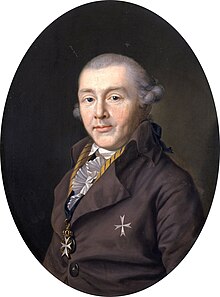August of Saxe-Gotha-Altenburg
August von Sachsen-Gotha-Altenburg (born August 14, 1747 in Gotha ; † September 28, 1806 ibid) was a prince of the Saxon-Gotha-Altenburg line of the Ernestine Wettins and a patron and esthete during the Enlightenment .
Life
August was the youngest son of Duke Friedrich III. von Sachsen-Gotha-Altenburg (1699–1772) and his wife Luise Dorothea (1710–1767), daughter of Duke Ernst Ludwig I of Sachsen-Meiningen . His mother took care of a very careful education. Together with his brother Ernst he was instructed in literary, scientific and cameral fields.
The enlightened prince, who is considered to be cosmopolitan and progressive, went on an educational trip to the Netherlands and England with his brother from 1768 to 1769 . He gave up his planned military career, meanwhile appointed colonel and head of the regiment, as early as 1769 and transferred his Gothic infantry regiment in Herzogenbusch to his nephew Friedrich . His first trip to Italy led in 1771 via Geneva to Milan and Rome, in 1772 on to Naples and via Florence back to Gotha. After the death of his father in 1772, he retired from military service. In 1777 he began a friendship with Herder in Weimar. In the same year another trip to Italy followed via Verona and Venice to Rome, during which he met the enlightener Voltaire in Geneva in 1778 .
In 1776 he had the government councilor Hans Wilhelm von Thümmel (1744-1824) build the Prinzenpalais in Gotha , a villa in the Palladian style that he had got to know in England, Holland and Italy. There he gathered a group of fine spirits from 1778 and is described as the most important mediator of French literature in the Weimar classics . August was in lively exchange with Johann Wolfgang von Goethe , Johann Gottfried Herder and Christoph Martin Wieland . He was considered a patron of the latter, who dedicated his Oberon to him.
August found his final resting place in the princely crypt of the castle church at Friedenstein Castle .
literature
- August Beck: August (Prince of Saxe-Gotha-Altenburg) . In: Allgemeine Deutsche Biographie (ADB). Volume 1, Duncker & Humblot, Leipzig 1875, p. 681.
- Götz Eckardt (ed.): The Italian travel diary of Prince August of Saxe-Gotha-Altenburg, the friend of Herder, Wieland and Goethe. Stendal 1985
Web links
- The private library of Prince August (1747-1806) ( Memento from June 18, 2010 in the Internet Archive )
Individual evidence
| personal data | |
|---|---|
| SURNAME | August of Saxe-Gotha-Altenburg |
| BRIEF DESCRIPTION | Prince and patron |
| DATE OF BIRTH | August 14, 1747 |
| PLACE OF BIRTH | Gotha |
| DATE OF DEATH | September 28, 1806 |
| Place of death | Gotha |
